#but the very difference between the english and japanese dialogues.....
Explore tagged Tumblr posts
Text
reading the japanese and english takukamu S supports im just getting really emotional over the japanese version
when i reread the official english version, i realize they kinda water down how takumi really felt. that explains why i got REALLY emotional reading the japanese version. some of the changes were:
english: there is something else I wanted to talk about… japanese: will you listen to my request?
while this doesnt seem much, the eng version makes takumi sound calmer while jpn version makes him sound nervous. it was a bit odd when takumi says request but then
english: So…does this change anything? About your feelings toward us, I mean. japanese: Hey. Earlier... you said you would listen to my request. So, will you... forgive me for this?
apparently after confessing his feelings n telling the truth, jpn takumi clearly felt disgusted and horrified that he has romantic feelings for someone he was supposed to call sister. eng takumi once again makes him feel calmer and chill as if he had enough time to think and ponder--almost as if the big truth wasnt all that much--while jpn takumi is implied to have rued and suffered through his feelings, fearing that kamui will hate or be disgusted with him. after alls said and done, all takumi ever wanted was for kamui to accept him even if she doesnt love him
english: Avatar: When you said that you liked me, my heart started racing. But I didn't want it to show because I didn't know about Father. Everything is so confusing. Takumi: That's right. But in a confusing world, we must cling to the few fragments of truth we share. And the truth is that I love you, Avatar, and you love me. Let's build a future on that. Avatar: Y-yes. I think you're right. Let's give it a shot. What's the worst that could happen? japanese: Kamui: When you said that you liked me earlier, I was really happy. Because we're siblings, I've avoided saying such a thing... Takumi: Kamui-neesan... Kamui: ... But you came straight out and said you liked me. You showed me that it was okay to love you. Thank you, Takumi. I also want to stay by your side... Takumi: Nee-san...!! For you to have the same feelings as me, I've never been this happy in my life. So... I'll give you this ring. ... I'll protect you with my whole life. Kamui: ... I'm so happy, Takumi! From now on, please take care of me! Takumi: Okay...!
once again this ending!!!! while i do like the eng version the fact that it feels......less emotional than the japanese one. yes takumi is more assured of his feelings now that its reciprocated. i hate that the english version doesnt wanna highlight the 'i cant romantically love you coz i thought we were siblings' like cowards. apply the brocon/siscon themes in this game as its supposed to be. but yeah i still do appreciate takumi being more confident and kamui still being hesitant but they both embraced their feelings nicely
but the japanese one
oooohhh OOOHHH kamui straight up saying she loves takumi too but didnt act out coz she thought they were related. takumi preparing A RING eventho he was 70% sure she wont love him the same way. takumi saying he will protect her with his own life which brings the whole conquest story 10x more painful.
english: If you were aiming for my heart, you've struck true. This was meant to be…
cheesy cute S support dialogue. 10/10. adorable. the last sentence is my otp tag for them after all
japanese: Thank you, sister. I'm so very happy. No matter what people think...these feelings won't change. I love you.
HEARTBREAKING HONEST S SUPPORT. 12/10 MAKING ME CRY. LOVE THAT HE PROMISES NO MATTER WHAT HE WILL ALWAYS LOVE HER. GOOD GOD
and my personal favourite difference of them all?
english: I'm sorry. I struggled with whether or not to tell you any of this. After all, now that you know, we can never go back to being siblings. But I couldn't simply pretend to be your brother for the rest of my life. Especially not with the way I felt about you. It is shameful, I know.
again takumi is being calm and somewhat professional. he knows its weird and tbfh i hate that the localization want to highlight how weird it is. we get it i know. but they make takumi level-headed which when i think back is kind of off for him but i appreciate the maturity of his behaviour here
japanese: I'm sorry... Nee-san. I was really at a loss as to whether I should tell you this or not. Now that I have, we can't go back to being siblings. But I... couldn't have beared living my whole life acting as your brother. I would have rather died...
FUCK FUCK FUCK FUCK FUCK FUCK FUCK OHHH MY GOOOOD FUCK FUCK FUCK AAAAAAAAAA!!!! i can hear his pain. his sorrow. his guilt. there is no voice acting in the supports but i can HEAR takumis emotions. the very fact that he loves her so so much and he cant bear pretending to be her brother anymore. the very fact that seeing kamui with another man might n will kill him. the very fact that he would rather die than pretending to be someone hes not. this is what im eating. this is what ive been robbed. this very line made me cry THE SECOND I READ IT im about to cry now!!! that very last line is just a big Fuck You to his fate in conquest GOD AAAAAAAAAA
#anyways hi. im very normal about takumi and takukamu#im only holiday today so its only fair. that i feel normal. about takumi#fafar yaps#about fe14#i believe his final S support dialogue is the same#it has the same emotional impact so ill give kudos to that#but the very difference between the english and japanese dialogues.....#like. i get tht the eng got a few gripes#and while the japanese version has its flaws too#its kinda annoying to know that they got rid or entirely change a characters personality/dialogue
6 notes
·
View notes
Note
I have a question about Jpn v Eng fandom differences? I've always been really disturbed and hurt by how the Eng fandom treats Jamil's ob situation compared to the other boys as somehow less forgiving or understandable since Kalim is so beloved. But I've been told this might be because the Eng servers greatly tone down the slavery/master situation as less "indentured" and more "employed but miserable". How does the Jpn fanbase generally feel about Jamil?


Yes, there were significant changes made to the Scarabia duo in the Twst localization and I believe it is these changes that resulted in the English-only fandom misunderstanding Jamil's reasons for overblotting + treating Jamil's OB as "less serious" than the others. I believe it has very little to do with Kalim's popularity, as I don’t recall him being very popular in EN and especially when compared to the other dorm leaders.
So firstly, what you heard about EN changing the master/servant relationship to an employer/employee relationship is somewhat correct. In JP, they consistently use "servant", "aide", or "personal attendant" to refer to Jamil and his family members' status. In EN, they sometimes use words like "helper" or "employee" or “aide” instead of "servant". Jamil’s parents are referred to as part of the Asims’ servants, but the term “servant” is scarcely used to refer to Jamil’s own relationship with Kalim. This by itself already somewhat lessens the power gap between the two, as using words like "helper"/"employee"/“aide” just give the impression that Jamil is simply disgruntled and could leave to find employment elsewhere whenever he likes. In reality, this is not the case--but it is not properly conveyed in EN.
The bigger factor at play here, I fear, comes from the edited lines of dialogue explaining the consequences for Jamil breaking from the Asims' control. In JP, he states that his entire family would suffer if he dared to defy the Asims. He provides an explicit example of being put out on the streets if he acts in selfishness. These lines are scrubbed and replaced with, "How could I betray our history like that? It would be beyond the pale. Not to mention the lecture I would get from my parents. I'm sorry, but it just wouldn't be right."
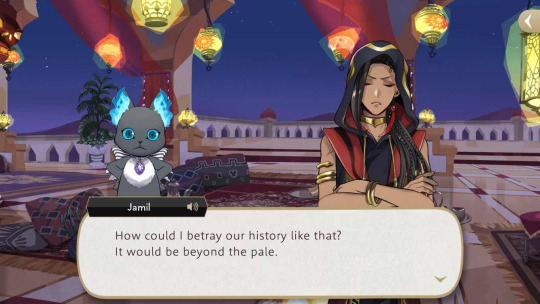




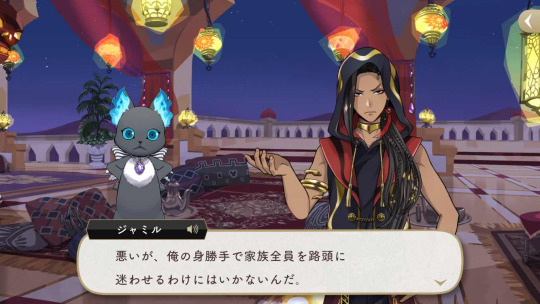
So... in EN, Jamil's worst worry is that his parents will be mad at him, versus in JP, where Jamil confesses his entire family will be without ANYTHING if he steps of line. JP gives the impression that the Vipers are almost being held hostage to force Jamil's obedience and servility. I think you can see why this would result in some different perceptions based on which version you play. To be fair to EN though, Jamil does get the line, "There would be consequences for my entire family if [Kalim] were exposed to any danger." However, said "consequences" are left vague and never elaborated on.
This has been an endless source of ire for Scarabia (and especially Jamil) fans 😔 It hurts them to see their favorite boys and their nuanced relationship fudged this badly. It hurts them to see others not grasping the full extent of how powerless and hopeless Jamil is in his circumstances. It hurts them to see people comparing Jamil’s trauma to others’ trauma and deeming it unworthy of empathy. It’s so ironic that a huge part of Jamil’s frustration stems from him having no one who understands him, yet the localization has made it so that English-only players aren’t understanding him as intended.
To your question; Jamil is actually a reasonably popular character in the JP fandom. He's not top 5, but I believe he's usually in the top 10. I think a lot of it comes from finding his story complex (as they're getting the original version), but also because a LOT of Japanese people--or those who come from collectivist cultures--find his struggles relatable. Filial piety is very strong in many eastern cultures, and Asians generally feel an immense pressure to be loyal to their families or to take actions that would benefit the group, even if it makes the individual miserable... all for the sake of preserving the group's harmony. This concept is less prominent in the west, so this, paired with the changed dialogue lines, may have resulted in Jamil's story not quite landing with western audiences.
#disney twst#disney twisted wonderland#twst#twisted wonderland#book 4 spoilers#twst en#twisted wonderland en#twst jp#twisted wonderland jp#notes from the writing raven#question#Scarabia#Kalim Al-Asim#Jamil Viper
249 notes
·
View notes
Text
Posting this clip early for the Komaedaologists in the room.
(Context: this is a patch I'm making for the Steam version of SDR2 that retranslates all the text to fix the abundant translation errors and to flow better in English.)
Anyways, Komaeda's intro has a number of things I had to change. I added back in Komaeda's speech patterns; his tendency to use filler words more than the other cast members. There was also one big mistranslation, where the translators mistook him as praising his luck for getting into HPA. However, it's supposed to be him praising HPA's studiousness for being the reason they wanted him in.
You may also notice Hinata has some differences in his text. By far and large, he's the character that suffers most from stiff, unnatural dialogue. This is because most of his dialogue, when translated literally, sounds this way. So for a lot of his lines, I'm capturing the essence of what he means rather than the literal words. You may also notice he swears a bit more. Japanese doesn't have "swear words" in the sense of being equivocal to English. However, Hinata speaks in a very rough, masculine manner that comes off as somewhat rude. I would compare it to someone who has no issue casually swearing in public. Hence the change. It also makes the transition between his spoken words and his deeper thoughts more apparent and humorous. Hinata has a tendency to speak like a tortured poet, for lack of a better example, when he heavily reflects on things. I'm certain this was done on purpose to be somewhat humorous, as outside of these poetic thoughts, he speaks very dryly and unambiguously.
Those are the big ones, I think. If you have specific questions or want to know the hows and whys, ask away. I'm having fun with this so far :)
153 notes
·
View notes
Note
Hello!
Bit of a dumb question
I wanted to know if it was ever mentioned anywhere that Jade ate his siblings.. My sister keeps saying he said that he ate everyone but kept Floyd bc he looked like he'd be funny or something. I've never seen this mentioned before and I wanna prove her wrong
Hello hello!! ^^ Thank you for this question!
“Jade ate his siblings” is one of many unproven fan theories, based on a number of comments in the game that might be hints about something that may or may not have happened!
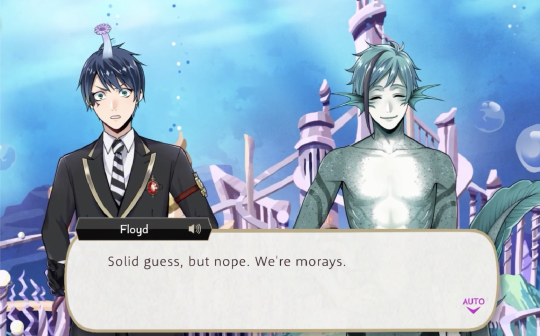
The theory goes that Jade and Floyd hatched from eggs (moray eels can lay up to 10,000 eggs at once in real life, though in-game is unspecified) at approximately the same time.
Jade then selected Floyd as the one sibling he would spare, and ate the rest. (The reason why he chose Floyd is technically not specified.)

This is based on many things that can be found throughout the game, such as this cryptic comment from Jade: “I’m glad I chose you as my partner when we were but little elvers.”

Floyd responds, “Not sure what that smile’s for, but I’m glad we survived together, too,” which may insinuate that if something did happen, Floyd might not know what it was.

Jade also says, “there are five in my family at present.” One interpretation of this line is that their family used to be larger, and might get even smaller in the future, but five is where they are at now.

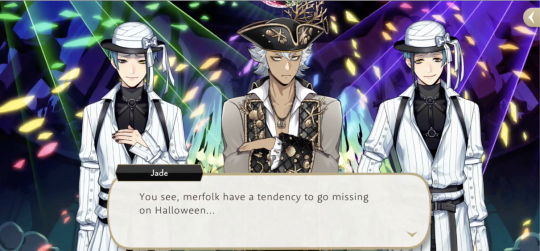


The more optimistic side of EN fandom will sometimes theorize that maybe their mother is pregnant and there will actually be a new addition to the family soon rather than a loss, but we have been given a surprising amount of information about how common it is for people to go missing in the Coral Sea, with otherwise zero hints that they will soon be getting between 1 and 10,000 new siblings.
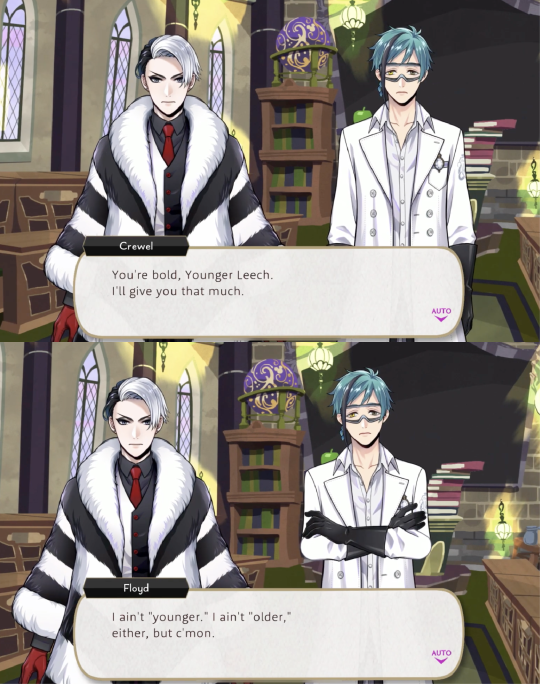
The evidence used for the “hatched from eggs” part of the theory comes from Floyd insisting that neither he nor Jade are any older or younger than the other.
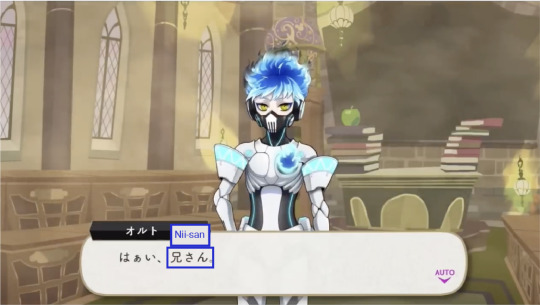


This might seem vague in English, where which twin of two was technically born first might not come up very often, but in Japanese one twin being born first would mean that one of them would refer to the other as something like “nii-san,” like Ortho does with Idia, or "aniki," as Ace does with his brother and Leona does with Falena.

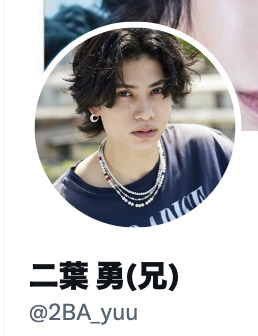
(For a real-world example I recommend referring to the Twitter account of Jamil’s voice actor, Futaba Kaname. He has (弟) in his username for “little brother,” while his identical twin Yuu has (兄) in his username for “older brother.”)

But neither Jade nor Floyd refer to one another as “nii-san," "aniki" or anything but their first names.
While “bro” or “brother” will sometimes be added to their dialogue on EN neither twin has ever actually called the other “brother” in their original dialogue, because the Japanese language makes you specify older or younger (an age-neutral word for “brother” doesn’t really exist) and, as Floyd says outright in the game, neither he nor Jade are any older or younger than the other.
This makes sense if they both hatched from eggs at approximately the same time, rather than being born like mammals.
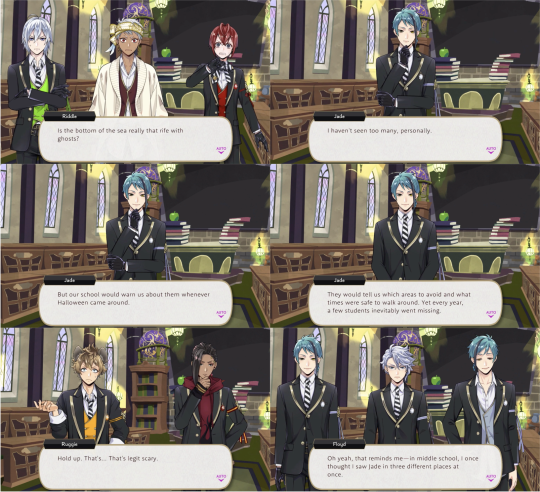

Another point that is often referenced in the “Jade and Floyd: Dead Siblings” topic is how, on the subject of ghosts they have seen, both twins mention seeing people on Halloween that looked strikingly like each other, only to realize that they weren’t.
Floyd: “I once thought I saw Jade in three different places at once.”
The theory goes that they saw the ghosts of their dead siblings.
This may or may not be considered evidence of how the twins might have had other siblings at one point and something happened to them, but even if so, it could have just been a Finding-Nemo style incident with a barracuda or something similar.
So why do people point to Jade as the perpetrator?
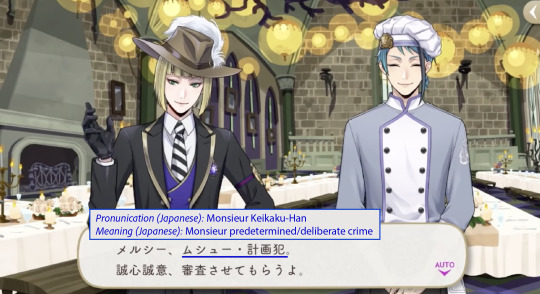
(Maybe irrelevant, but Rook’s nickname for Jade in the original game is, “Monsieur Premeditated Crime.”)
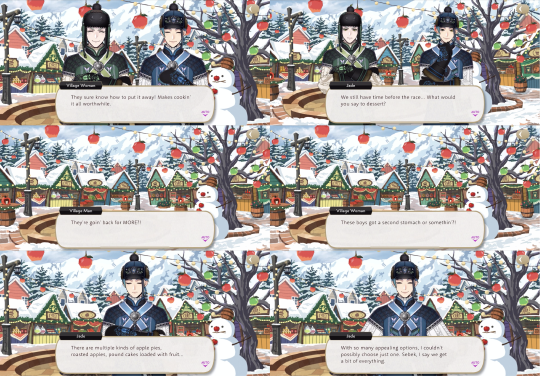

Jade is a heavy eater, on par with Sebek (another thing they have in common is they have both threatened to eat Grim), saying that people are often surprised by how much he eats.


Jade says this is because his “fuel efficiency is lacking” (low blood pressure?).
Floyd is aware of this and seems to go to extra lengths to make sure Jade eats properly, encouraging him to relax and fetching food for him during Halloween.
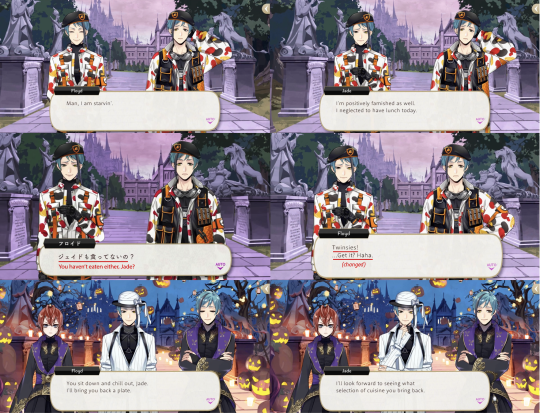
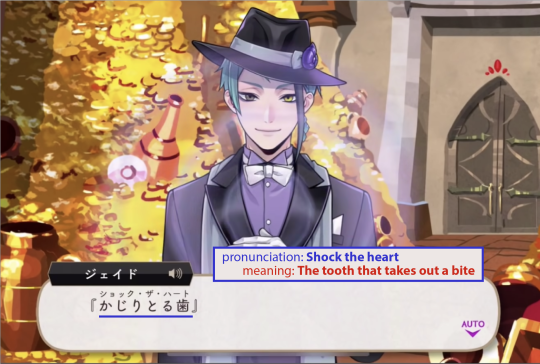
The original meaning of Jade’s unique magic is, “the tooth that takes out a bite,” so this is definitely a theme with him.
And his official, disliked food? Eel.
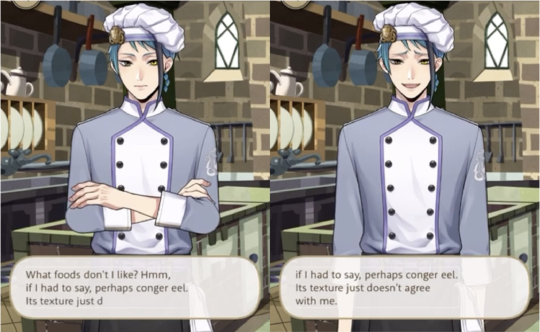
To the original question: no, there is not a definitive line in the game that states “Jade ate his siblings” that we can point to as proof that it actually, canonically happened.
But we do have many cryptic lines that might possibly be insinuating that a infamously hungry Jade chose Floyd as the one sibling he would spare and ate the rest, Floyd may not know it happened, and Jade might be actively choosing not to tell him 🐬
411 notes
·
View notes
Text
A short summary on why many Japanese fans don’t see Apollo and Nahyuta as brothers:
-The localization and original Japanese version differ quite a bit. Dhurke’s speech quirk of constantly calling Apollo “son” is not present in the Japanese version. The father-son themes are much, much more overt in the localization. Like, they’re still present in the Japanese version and Dhurke still clearly view Apollo as his son but the localization bashes you in the head with it.
-The localization makes it seem like Apollo was legally adopted by Dhurke when the Japanese version makes it clear that wasn’t the case.
-There’s many official supplemental materials in Japanese clarifying Apollo and Nahyuta’s relationship that don’t exist in English.
-Lack of sibling honorifics and other linguistic aspects/certain dialogue between Apollo and Nahyuta (as well as the lack of such language from characters like Dhurke and Datz) convey that Apollo and Nahyuta don’t see each other as siblings. Nahyuta explicitly uses language that you cannot use with siblings, which I confirmed this with multiple native speakers. A lot of these linguistic aspects are not translatable into English.
-Dhurke’s relationship with Apollo as his foster parent and Dhurke’s relationship with Nahyuta as his blood father is treated as two separate things in both the original version and supplemental materials. Interestingly, both the Japanese and localization, have one line (weirdly in different places) where Nahyuta addresses Dhurke as “Father” whereas Apollo never did such.
-Cultural differences; childhood friends (that aren’t siblings) raised together and sharing parental figures is a very common thing in Asia and trope in Asian Media. It’s possible that the localization went with more of the adopted angle to appeal to the Western audience.
-The scene with Ga’ran referring to Nahyuta Apollo’s brother feels just as shocking as when Dahlia called Maya Phoenix’s girlfriend in 3-5. Ga’ran didn’t know of Apollo’s existence until five minutes before the trial, so the fact on the outsider completely removed from the situation said this, as opposed to Datz and Dhurke, solidifies that Ga’ran knows nothing about them and their relationship. Weirdly enough, Ga’ran mentions “brother” twice in the localization as opposed to just once.
There’s more points I’m forgetting but that’s from the top of my head. I plan on making an extensive post going in detail with screenshots and direct quotes later.
167 notes
·
View notes
Text
Phoenix's careful wording in 4-1
I noticed something about 4-1, Turnabout Trump. Phoenix uses very careful wording. He never outright lies, mostly misdirects. Like when he's asked if the locket is his, and he says the locket has his daughter's photo inside. But the most important misdirection here is about the forged card. He never shows it as actual evidence from the crime scene: if you look carefully at his words, he actually shows it as evidence of the reason why the killer would have taken the card. He's even meticulous about verb choices. In the ENG ver,, he even outright says the card is his. Everyone simply assumes. Also Apollo, unknowingly, doesn't present it as evidence from the crime scene, either. Anyway, here are some parts I found particularly incriminating. JP text beside ENG for comparison's sake. I'll only provide translation for the relevant parts (or the parts that differ between versions). But as you can see, the misdirection is there in the JP version as well. Disclaimer : I only studied Japanese for a little while. AA dialogue is pretty simple though. Also English isn't my native language either. Feel free to correct me on anything wrong here. Also note that I'm not trying to make the translations sound natural, I'm mostly trying to explain what the words are saying, sometimes I'll be more literal than others. Translation =/= localization. Translation notes and musings are in small text.
Judge いかがですかな? 弁護人。 Well, Mr. Justice? カードがスリ替えられて、 持ち去られた“理由”‥‥ The question of why the killer would swap out a card has been raised. そのコンキョを提示できますか? Can you point to a reason? Apollo (‥‥どうやら、 ここが“勝負どころ”だ!) (…It's now or never!) なぜ、カードは スリ替えられたのか‥‥。 Naze, kaado wa surikaerareta no ka... The defense would like to present evidence to the court… Naze, kaado wa surikaerareta no ka... Why the card was switched... 弁護側は、その“理由”を 提示したいと思います。 Bengogawa wa, sono "riyuu" o teiji shitai to omoimasu. Evidence showing the reason why a card was swapped out! Bengogawa wa, sono "riyuu" o teiji shitai to omoimasu. The defense would like to present that "reason".
Judge これは‥‥まさか! Could… this be…!? 現場から持ち去られた “5枚目のA”ですかッ! Could this be the missing fifth ace!? Kristoph ば‥‥バカな! なぜ‥‥なぜ、キミが‥‥ In-Inconceivable! How could you… そんなものを持っているのだッ! What are you doing with that card!? Apollo そ、それは‥‥その。 (なんだ、このあわてようは‥‥) Um, well, that's the thing… (Why's Mr. Gavin so upset?) (アヤシイ女の子からもらった、 ただのアヤシイカードなのに) (Ayashii onna no ko kara moratta, tada no ayashii kaado na noni) (It's just a fishy card from some fishy girl…) (Ayashii onna no ko kara moratta, tada no ayashii kaado na noni) It's just a suspicious card given by a suspicious girl... Apollo doesn't even understand the weight of the card when he presents it. He's just doing what Phoenix is pointing him to. He thinks it's just a suspicious card, and he's only using it to provide a "reason". At first, I was confused by this, because he seemed convinced later on that the card was real. But it appears that at first, he was indeed suspicious of it. It's just as the trial goes on, he's manipulated to think the card is indeed real. Because he trusts Mr. Wright, which *seems* to say it's real. Phoenix そのカードはね。 あの晩、事件の後‥‥ 《ボルハチ》で、 ぼくが拾ったんだよ。 Sono kaado wa ne. Ano ban, jiken no ato... "Boruhachi" de, boku ga hirotta n da yo. Oh, that card? It's mine. That is, I picked it up at the Borscht Bowl Club that night after the murder had occurred. カードは商売道具だからね。 ‥‥ムスメにわたしておいたんだ。 Kaado wa shoubai dougu dakara ne. ...Musume ni watashite oita n da. I gave it to my daughter. Cards are her stock and trade, after all. In the ENG, 'It's mine' is actually an addition. Maybe to drive the point home more? The rest is the same though.
Phoenix じゃ、ハナシをつづけようか。 Ja, hanashi o tsuzukeyou ka. Allow me to elaborate. Ja, hanashi o tsuzukeyou ka. Well then, let's continue this discussion? (fun fact: hanashi can also be traslated as 'story', or even 'fable', you could say hanashi is the noun version of the verb hanasu (to talk, tell) so it's basically anything you 'talk' about) この“血痕”が原因だった としたら、どうでしょう。 Kono "kekkan" ga gen'in datta to shitara, dou deshou. What if this trace of blood was the reason? Kono "kekkan" ga gen'in datta to shitara, dou deshou. (what) If this ''bloodstain'' was the cause... what do you think? The 'dou deshou' is usually also traslated as 'what do you think?' - it's used after you make a statement and you want to ask for the other person's opinion. But mostly it's a rethoric question. 'What about it?' would also fit. Also interesting how "bloodstain" is in quotation marks...
Phoenix 現場写真‥‥被害者の頭部を もう一度、よく見てください。 Take another look at the photo… and at the victim's head. 犯行の瞬間、帽子は床に落ちて、 このとおり‥‥ At the moment of the crime, his hat fell to the floor… ひとすじの血が、 後頭部に向かって流れています。 …and a trickle of blood ran from his forehead down the back of his head. この血が、一滴。カードに落ちた。 ‥‥そうは考えられないでしょうか。 Kono chi ga, hitoshizuku. Kaado ni ochita. ...Sou wa kangaerarenai deshou ka. Couldn't a drop of that blood have fallen on one of the cards? Kono chi ga, hitoshizuku. Kaado ni ochita. ...Sou wa kangaerarenai deshou ka. This blood, this drop. Fell on the card. ...Is that unthinkable? / ...Is that unimaginable? He's basically proposing a theory. Not said the card in Apollo's hand is actually the one. Apollo カードに、血が‥‥ Kaado ni, chi ga... I suppose… Kaado ni, chi ga... On the card, the blood (fell)... Apollo is following along with what he's saying. Phoenix ハンニンは、それをかくすために カードを持ち去ったのです。 Hannin wa, sore o kakusu tame ni kaado o mochisatta no desu. The killer then took the card to hide the blood. Fun choice of words. 'no desu' = 'the explaination is that...' or, in this case: 'the explaination would be...' This is the more literal translation just to make it more obvious how he phrases it: The culprit, in order to hide that he took the card the explaination would be So in a way that it's actually comprehensible: The explaination would be that the culprit took the card in order to hide that (the blood).
Kristoph 成歩堂! キミも 一度は法廷に立ったオトコだ。 Wright! Regardless of how you wasted the last seven years, you used to be a lawyer! 証拠品を隠すことが、 どれだけ大きな“罪”であるか‥‥ You know what a serious crime it is to conceal evidence! Phoenix そのギロンはあとだよ、先生。 それよりも‥‥ Sono giron wa ato da yo, sensei. Sore yori mo... Oh, we can discuss the finer points of our legal system later… Found it funny how he calls him 'sensei' but in a way that is very mccking. 'Sensei' means someone who is masterful/very knowledgeable in something, in this context, law. He says 'Let's leave that discussion for later, sensei. More importantly...' これで、きみの疑問に 答えるコトができたようだね。 Kore de, kimi no gimon ni kotaeru koto ga dekita you da ne. What's important now is that I've answered your question. Kore de, kimi no gimon ni kotaeru koto ga dekita you da ne. And with that, I was able to answer your question, wasn't I? Basically says the same thing, but uses 'dekiru' = 'to be able to' Kristoph な。なんのコトですか? Wh-What are you talking about? Phoenix ハンニンがカードを 持ち去った“理由”だよ。 Hannin ga kaado o mochisatta "riyuu" da yo. You wanted to know why the killer would have taken a card from the crime scene. Hannin ga kaado o mochisatta "riyuu" da yo. The "reason" the culprit took the card. カードに残った、1滴の血。 Kaado ni nokotta, hitoshizuku no chi. And now, I've told you. A drop of blood, it feel on the card. (That was why) 彼にとっては“致命的”だった。 ‥‥だから、持ち去った。 Kare ni totte wa "chimeiteki" datta. ...Dakara, mochisatta. That one drop of blood would have been decisive evidence, you see. Kare ni totte wa "chimeiteki" datta. ...Dakara, mochisatta. For him, that (the drop of blood) was 'fatal'. ...So, he took it.
Overall, the word choice in both JP and ENG is very careful, but in different ways since... obviously they're different languages with different idiosyncrasies. In conclusion....
Phoenix basically treated the card not as evidence from a crime scene, but more of an example, a recreation, a construction. Never said that was the actual card. Made people assume. Didn't correct them. So... he manipulated their thoughts. He's like 'oh, you want to know the reason? well, let's see, why would the killer take the card...? well maybe it had incriminating evidence on it - oh what kind of evidence? look at this card here - see this drop of blood? what if the blood fell from the victim's head on the card? so he had to take it - because it would have made it obvious the killer entered from the secret passage and how the murder actually happened' Something that breaks my heart immensly about all this is that Apollo is so adamant at the start of the trial that Mr. Wright would never lie... and he's furious and heartbroken that he basically manipulated him (and everyone else), instead. Phoenix literally couldn't lie anyway, because then Apollo would have known. If you think about it, it's kind of how Engarde was able to lie to Phoenix even though he had the magatama. He purposefully and meticulously manipulated people to think the evidence was real, without ever saying it. Putting the words in other people's mouths. (Also... at least to me, this seems a very prosecutor-like tactic. Perhaps even Von Karma-like.)
Why does he even tell Apollo that he forged it? (He didn't have to.) Because he felt guilty. Apollo asks how he can call himself an attorney and he tells him he, in fact, doesn't call himself one. Doesn't have the right to. Phoenix isn't a liar - he says so himself after the trial, he never lied - but he sure is a manipulator here. But he does feel guilty. He lets Apollo punch him. And he smiles. I think this shows how even when we believe that what we're doing is wrong, we might do it anyways. Out of desperation, anyone might cave and go against their own morals.
#ace attorney#phoenix wright#apollo justice#kristoph gavin#ace attorney apollo justice#musings#aa musings#aa localization
250 notes
·
View notes
Text
Rambling about Marie....
I wanna quickly talk about something because i was looking around on Inkipedia and i stumbled across this interesting dialogue exchange from Callie and Marie during the live performance at Tokaigi in 2018.




Now i have talked about the official translation of this dialogue before a while back and it's surprisingly very different from the translation done on Inkipedia. Now this could be just a very rough translation and that's why the Inkipedia one is so different but i find it to be very interesting.


In the original Japanese dialogue it's more clear that Callie is making a joke and playing around with Marie and Marie freaks out a little. But Callie says "just kidding!" to ease Marie. However, in the official English translation, Marie is way more harsh and seemingly dismissive of what Callie has gone through. And Callie just goes, "Whatevs!" Like... it's pretty damn different tone wise.
The English translation makes Callie seem more like some airheaded idiot that doesn't remember what happened because "oooo brainwashing ooooo", but in the Japanese script, its more clear that Callie is being obviously snarky and cheeky towards Marie and she does remember what happened which is more in line with her character. Callie is not a dumbass, you have been fed lies. She's able to pick up on other people's emotions, especially her cousin's as she quickly says "just kidding!" to make sure Marie doesn't freak out too much and to know she's just joking around with her.
(Side note, only in the English translation do they call what Callie has gone through "brainwashing" and other characters like sanitized Agent 3 and Marina Agitando even though that's not really happened. In other languages it's always referred to as hypnosis. We don't have a fan retranslation of the Japanese dialogue for Splatoon 2 from my knowledge so i cant comment on that either unfortunately.)

Now to get to the point, It got me wondering... Does Marie have trauma or any sort of stress from Splatoon 2? And is that why she's way less snarky towards Callie in Splatoon 3 because she's terrified of Callie ever running away again and doing something irrational like joining the Octarians? From the Squid Sister Stories we can see that Marie often worries about Callie and overthinks a lot.

Even though Marie seems a lot more happy in Splatoon 3 and has matured a lot since the first game, like Splatoon 1 Marie is a different person from Splatoon 3 Marie. I think most of that maturing is out of fear and anxiety. Like you can't just brush aside your own cousin running away and the next time you see her, she's wearing some crazy outfit and is trying to murder an agent you hired to go find her in the first place. That would mess anyone up and especially someone like Marie who does have some mental troubles brewing under the surface.
I kinda wished they dived a little bit more into it but alas, we don't have a lot of stuff to go off of between Splatoon 2 and 3 as by the time the thrid game comes around Callie and Marie have matured and grown a lot in those 4 to 5 years. Which is good of course! But... I really would have liked to see Marie deal with the aftermath of those events. Maybe I'm asking too much i don't know...
#splatoon#splatoon 3#marie cuttlefish#marie splatoon#splatoon 2#hypno callie#autistic rambling#ramblings#rambles#text post#sanitized agent 3
150 notes
·
View notes
Text
Medicine Seller Pronouns
@dharmafox (sarahwatchesthings) in the Mononoke Commmunity asked about the Medicine Sellers' personal pronouns, and I was going to leave a comment, but as always I tend to go on, so I decided to make it a separate post.
I'll start with Kon, since he's obviously the most interesting. Ri's pronoun usage is really obvious and none of them are unusual. In the movie, Kon does not use any pronouns. This isn't unusual for Japanese as I'm sure many of you know. It's generally preferred to avoid using pronouns if possible, and Japanese makes it very possible. Additionally, Kon doesn't speak very much anyway so there aren't a lot of opportunities for him to use one. Nonetheless, in a lot of Japanese fanart you'll see him using あっし (asshi), although it's not 100%, it's such an unusual one that the prevalence of it in Kon fanart/comics is notable. So where does this come from? In the novelization of Karakasa, there are random changes to the dialogue of characters made here and there. I personally don't understand the reason for a lot of them, like they're kind of inconsequential and don't seem like the kind of changes necessary for adapting between media, but that's not the point. In Kon's first scene, when he introduces himself to Asa and Kame, in the movie he says:
只のしがない薬売りでございます。(tada no shiganai kusuriuri de gozaimasu) "Just a humble medicine seller." In the book, however, the same line is: あっしは、只のしがない薬売りでございます。(asshi wa tada no shiganai kusuriuri de gozaimasu) "I'm just a humble medicine seller." So they go out of their way to show him using this pronoun. What is it, exactly. Well, when I looked it up, the English description of it I found was: "Mainly used by dashing males and craftsmen," which was very funny, but also seemed a strange grouping to me. So I searched a Japanese dictionary and found this: 一人称の人代名詞。 「わたし」のくだけた言い方。 男性、特に職人などが多く用いる、いなせな感じの言い方。 "First person singular pronoun. Elided form of "watashi." Commonly used by men, especially skilled workers. An inase style of speech." What is inase? Unfortunately there isn't a lot of information about it in English, so I had to look at Japanese wikipedia and some other Japanese sources to piece it together. I'd like to warn you that this term is very deeply rooted in its historical context, and I am not an Edo period historian or even someone who knows a lot about Edo period culture. I would say I know a moderate amount, but definitely not enough to accurately convey subcultures and feelings of the time, which is what I'm about to attempt. So please take what I'm saying with a grain of salt, and if you find sources that disagree with me, of course take those into account. The word inase originates from a variation of the hairstyle called the ichoumage (ginkgo hairstyle), which is the most common hairstyle you see on men of the Edo period:
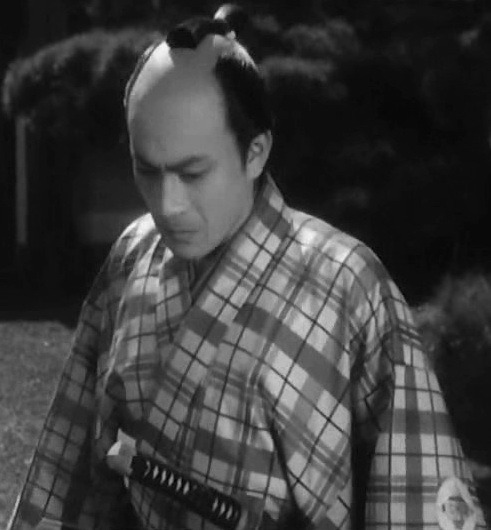
This is the image on the Japanese Wikipedia article for the ichoumage. It's also commonly called chonmage which is how I knew it, but according to Japanese Wikipedia that term originally referred to the thin, wispy one that older men would have.
Anyway, so an inase ichoumage (mullet's back ginkgo hairstyle) is a lopsided version of this hairstyle that was popular among young men of the Edo period. According to Japanese Wikipedia: "It was a word enjoyed and used, along with those long-strapped inase ashida they wore, by those quick-tempered and quarrelsome young men of the fish market, such as the skilled workers and chivalrous rogues (侠客/kyoukaku)."
Inase described this kind of roguish masculinity embodied by these working-class young men. Different from the refined sensibility of the upperclasses, it seems that inase could be likened to the kind of masculinity we today attribute to the popular image of, say, deli workers or perhaps construction workers. Young, working-class men with hot-tempers who represent a kind of spirit of the city. So this is the type of image asshi evokes. This is presumably what the author of the Karakasa novelization was calling upon when they had Kon use that pronoun. Interestingly, being a medicine seller, Kon is not actually part of this social class as far as I can tell; he's a merchant, a class which occupied a rather interesting place in society as the absolute lowest class in the hierarchy which possessed a great deal of wealth and social influence, but that's a separate discussion. Basically, it seems like the author of the novel wanted to associate Kon with these inase men, these young, roguish, kind of rough men of the time.
The last thing I want to say about Kon's pronoun usage is that it's possible he might use a different pronoun when speaking to say, Utayama-sama (if he uses one with her at all), but I haven't read that far into the novel. It wouldn't be surprising to me if he did though. As for Ri, as I recall he uses two different pronouns. In Ayakashi Bakeneko, he uses both ore and watashi, and in Mononoke, he uses watashi only (as far as I can remember, though if anyone remembers some instance of him using ore in the 2007 series, please let me know). Neither of these pronouns are unusual; both are in common use today. Before I get into describing them, I want to emphasize that pronouns are a really fluid class of words in Japanese. What pronouns are in use, who uses them, and when they're used has changed a lot and changed very quickly. Even today, one person does not only use one pronoun. First person pronouns aren't really like third person pronouns in English, where a person generally has one set that is used for them in all contexts and describes something fundamental to their person; in Japanese, a person will use different a different pronoun depending on their situation and who they're talking to. They represent your relationship to the people around you (I recognize this is just one way of looking at it). Statements like "X pronoun is used by X type of person" are almost always oversimplified and don't represent the variety of use cases in real life, however it is true that anime characters are constructed using common tropes and character types, so their pronoun usage can be analyzed a little more along those lines than you would do in real life.
Watashi is probably the most commonly used first person pronoun in Japanese, and for good reason. It's pretty neutral and polite, but because there is an overlap between polite speech and feminine speech, if it's used in a casual setting it's seen as more feminine (or just over-polite/stiff). Ri's speech differs somewhat depending on who he's talking to/what episode it is (it is normal to change your speech based on who you're talking to IRL though), but in general he speaks formal-masculine. It makes sense for him to use watashi especially considering he is socially below most of the people he talks to. Ore nowadays is associated with men and is considered to be a casual masculine pronoun, though it is worth noting that in the Edo period it was used by women as well, and in some dialects of Japanese it still is.
It's worth noting that these pronouns don't strictly convey one idea or not convey it; it's contextual. The same goes for any kind of language honestly, but what I mean is that if you're speaking to say, your boss or your teacher or a stranger, you should be polite to them because you either don't know them well, or you want to show them respect. In that setting, using formal/polite speech (pronouns included) is accepted and encouraged. However, when speaking with people in your circle, such as your friends or family, if you started speaking politely, you'd be suddenly putting distance between yourself and them, and it could even be rude. So it's not that one pronoun is always polite, always feminine, always rude, always masculine, it's that they have certain vibes, and that vibe combines with the context to produce an implication. Ri introduces himself to Kayo with watashi because he's a stranger to her and a merchant. Throughout the series, he generally uses -masu forms and some keigo, but also uses the sentence ender -ze sometimes, addresses Ochou as anata/
Oops, this post got away from me. Pronouns in Japanese are not easy to sum up quickly, and I feel like they're often oversimplified. Um...hope this helps!
81 notes
·
View notes
Note
Hi Qwille!! I love your fic and was wondering how you manage to include so many languages in it. is there a way you study or do you just know that many? It's really impressive O.o
Ahh thanks, it actually takes a lot of research and I get quite anxious about mistakes as I'm not fully fluent in any of them. So far I have only included languages I have had an opportunity to learn in someway or another, but in the future I need to include Swedish and Portuguese (and a few others), which strike fear into my heart as I don't know them at all.
I am Welsh and lived in Wales most of my life, so I know quite a bit of Welsh through exposure, though it was never spoken in my home.
I lived in Paris for a while so I have a decent enough grasp of French by necessity. I would love to learn more (it's a beautiful beautiful language and I loved living in France), if I ever got the chance to move back there I'd do it in a heartbeat. Unfortunately I don't encounter French speakers irl very often, so I don't get much opportunity to practice.
Japanese, I studied at university before I got sick and dropped out. (I get the most anxious about writing the Japanese as I know enough to know I ultimately know veeery little, and some things simple don't translate culturally let alone linguistically.)
My current plan is actually to pay a translator to go through the misuta dialogue at the end of each act! I will probably have to do this with a few of the other languages too when they turn up. I know that seems extreme but having accurate depictions of languages and cultures is very important to me. Imo if you are going to write at length about someone from another culture, getting that stuff right is basic respect (to that culture, but also your own writing and characters too).
It really takes me out of a story when people get that stuff wrong about my home country/language, so I don't want to do that to other people.
Lil interesting factoid: Bubbie probably spends more time Ameripicking GITM to get rid of the Britishisms than they spend doing normal editing! Cricket is an American character and I want them to feel like an American character and respect that as much as any of the other cultures in GITM. As the main POV character, it would probably be very jarring if they used Britishisms! Also it's fucking insane how many differences there are between UK and US English!!
Hahaha I guess the only character I can write with complete authenticity is Fool :)
#wow this ended up long#soz#gitm au#ghost in the machine au#ghost in the machine#asks answered#languages
126 notes
·
View notes
Text
DGM 252: New perspectives and confirmations it has given us
⚠️First of all, I'll be tagging this under DGM spoilers so if you have somehow stumbled upon this even if you're avoiding spoilers for Chapter 252 (or the most recent DGM talks as a whole), this is your warning to turn back now!
And secondly, I'm under the effect of allergy meds so please pardon me if I'm talking gibberish 😂 But the latest chapter has given us some food for thought and I've been mulling it over.
There are two points I want to cover in this post; the first one being much extensive while the other is rather short.
1. Bookman Jr.
The reveal that the guy we had thought to be Past!A all along was actually the former Bookman Jr. in one of the best twists Hoshino has given us in a while - she sounded very proud of how we were all misled by her narrative and honestly I tip my hat at her for such genius - has also fueled questions about his identity.
I'll start by saying I do not believe he and Cross are the same person. That's not what I'll be talking about so I'm playing this card right off the bat. This theory, although popular, has always had way too many gaps for my liking and after the latest chapter, the chances are practically null that it's true.
If you want a discussion as to why, this post has put it into words better than I could and I agree 100% with OP's point, hence why I don't see the need to say anything on the matter.
But there's one thing that I'm yet to see people discussing and it's about the talk Lucia had with Joe back in The 222nd Night: Searching for A.W. - Hypokrisis.
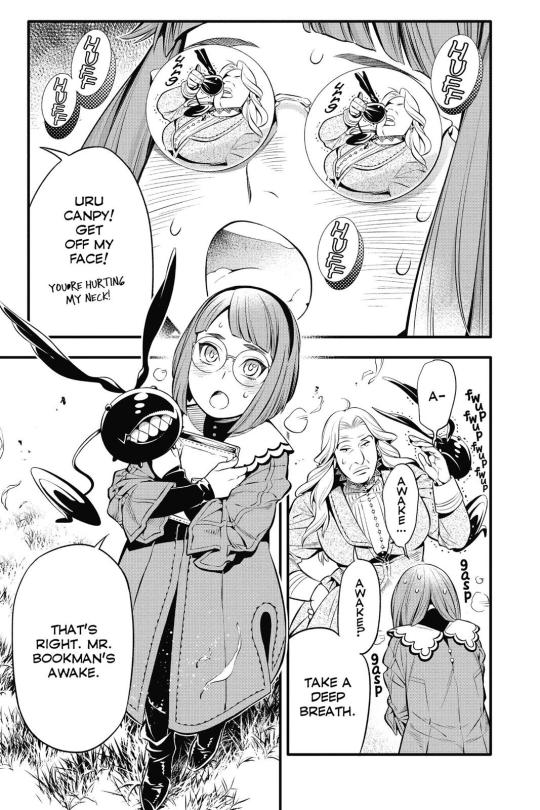
(I'm showing what I believe to be the official translated English version by Viz and there's a reason why)
For a long time, people have debated about this small exchange between Lucia and Joe. There's no doubt the one they're talking about is old man Bookman, so we can confidently affirm he's the one waiting at the Campbell Mansion.
And what about Lavi? This is where the next dialogue from Lucia comes into play:

Since this is probably the version a lot of people have read, I must make it clear that the like "Junior, his successor, isn't here" was a mistranslation. Here's the original:

Lucia: Koukeisha to naru Jr. wa mou imasen. (The one who'd become his successor, Jr, is no more.)
I've double-checked with the Brazilian Portuguese translation because it tends to be as close to the original as possible, and surely enough, it's translated correctly:
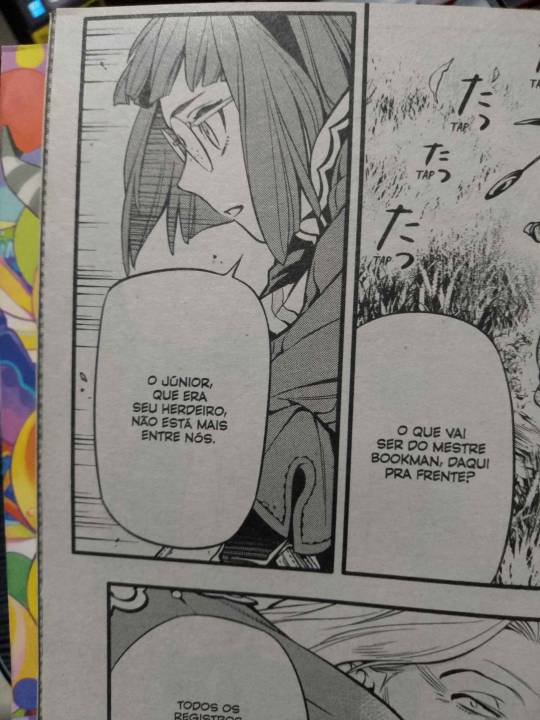
(image courtesy of the volume I own by my so-so phone camera 😋)
"Junior, who was his heir, is no more."
The literal translation for what Lucia is saying is "isn't among us anymore", but that's an expression in Portuguese that means that someone has died/doesn't walk on Earth anymore.
While the mistranslated English version and the original Japanese/Brazilian version have similar meanings, the way it's worded gives the sentence a completely different meaning: in one we're led to believe Jr. isn't physically there at the Mansion, while the other two make it clear that Jr. has died.
And that's exactly why that, after Chapter 252 dropped, this scene is given a new perspective - because Lucia was referring to the former Bookman Jr, and not the current one.
We don't know the whereabouts of current Lavi - cue in the chair jokes, I unfortunately love them all - and while I might be wrong, I have my reasons to believe he's alive.
It just doesn't feel like Hoshino to kill an important character off-screen, plus she has said we'll see him again eventually and that the mystery of what's behind his eyepatch is still to be revealed (and will only happen once Bookman passes away, something that will possibly happen before the story reaches its end).
I have the feeling Lavi still has much to contribute to the story and he's actually one of the characters that, to me, seem to have the highest odds of making it alive until the end. It also isn't mere coincidence that Bookman picked the same alias for both Juniors, since Lavi has mentioned in a discussion room that the aliases refer to their record logs and the Holy War is being recorded under 'Lavi'. There's unfinished business to be taken care of.
Using the mistranslated version to illustrate was important because I've seen people wondering where Lavi is if not in the Mansion, while others were afraid he has died. He's very likely in a predicament, but dead? I don't think so.
So that only leaves us with one viable subject for that dialogue, that being the former Bookman Jr. (now affectionately dubbed Lavi Sr. by the fandom).
"But how come they didn't know Bookman already had a new apprentice back in Chapter 222 if the Zoogles mentioned it in Chapter 251?"
Yes, it's a little odd. What I can infer from this is that they either 1. Didn't know Bookman already had a new Jr. because he had been unconscious and only after they stabilized his situation they could talk, or 2. Did know about the current Lavi but believe him not to be ready to take on the mantle yet while Lavi Sr. was (but unfortunately deserted the clan).
Since only the Bookman and his appointed apprentice, who was born with the seal, can exchange information and records via their blood, it might be not that off the chart that the Zoogles weren't up-to-date on his affairs since they're not Bookmen themselves but rather a bloodline of people scattered across the globe who are supporters of Bookman's mission like Lucia has explained. Yet, even if they aren't all-knowing, it seems odd for them not to know something as vital as that about the person they're supporting.
And of course, there's also the possibility of option 3, something else that I completely failed to consider right now. Time will tell which one.
Note: By the way, the Lucia in 222 and the Lucia in 251/252 are indeed the same person; Hoshino seemed to hint there's a reason behind her sudden aging that we don't know yet. It's important to make this clear since what I've said is related to dialogues delivered by her.
2. Past!A = current Allen

(image courtesy of Kougeki Scans' Chapter 251's translation)
There were theories around and people still considering the possibility of our current Allen being a clone and all sorts of theories because of the unexplainable age gap between him and Past!A, but it seems the deaging theory has been fully confirmed by Chapter 252, as we saw it taking place before our very eyes.
There are still some mysteries surrounding it, but seeing how Apocryphos mentioned the "Helix", we can't help but be taken back to the explanation we've previously seen about the Helix of Life (The 221st Night - The Clown's Joke).
Since that's a topic that feels like there's more to it as of now, I won't be discussing the how and why Allen deaged, especially with the unseen variable in the mix that is Innocence; who knows if that might make the Helix energy behave differently.
I was on the "deaging theory" train because Nea was able to recognize Past!A all right when he looks in the mirror (The 214th Night: Searching for A.W. - Awakening) and also questioned the presence of Innocence on his body as well as how he hadn't aged but instead had gotten younger (The 215th Night: Searching for A.W. - By Your Side).
There are many mistranslations in the official English version of these two chapters (214 and 215) that have fueled countless misconceptions within the fandom but I won't be pointing those out in this post since I'm not here this time specifically to talk about it.
Note: Mangadex seems to have nicely translated versions of these chapters if you want to check them out for a recalling - I can't confirm fully but what I read of them looked consistent and faithful to the original.
Anyways, back on track; now that we've seen what took place 35 years ago in Chapter 252, Nea's bewilderment at the current situation of Allen back in Chapter 214/215 makes a lot more sense.
And even more interesting is that as soon as he noticed the Innocence lodged into Allen's left hand, we see the image of Apocryphos, as if Nea could feel its presence. Turned out that meant more than just Apocryphos being able to resonate with all Innocence, but rather, that the very reason why that Innocence had found home in Allen's body was by its intervention.
Just what the hell, dude. That was, once again, extremely well-played on Hoshino's part. I'm really looking forward to the next chapter!
#DGM#DGM spoilers#analysis#d.gray man#d.gray-man#there was a third point I wanted to cover but the meds make me run on only two overworking braincells#so I actually forgot which that was#it's possible I covered it while talking about the other two points because I have the feeling I talked about everything I wanted#but if the post feels lacking somehow that's why
81 notes
·
View notes
Note
One thing I learned from reading your posts is that how much puns are being used in One Piece, it really feels like most of the jokes get lost in translation or not translated at all.
it's difficult because like, most of the wordplay in one piece is untranslatable into english since it relies on sound-alike words, and japanese and english are distant enough as languages that translating jokes like that directly is generally unfeasible. like, just off the top of my head from the chapters i was reading yesterday, one of ryokugyuu's attacks is called 禁憎森々/kinniku morimori, the kanji of which translate directly as like 'hate-free forest' or 'forest without hate', which is the meaning his preceding line sets up, but the word kinniku in common use (normally written 筋肉) actually means 'muscle', so it's also 'muscle forest.' so that's a fairly surface-level pun, and it's like, how do you translate that? in english, 'hate-free' and 'muscle' are words that sound very different- there might be a specific word you can choose that would evoke both meanings, but i can't think of any off the top of my head, and translators generally work pretty quickly. and if you say like 'muscle forest without hate' or something like that, that just sounds like nonsense.
and with attack names like that, the stakes are way lower than with actual dialogue, where often important information is being conveyed. every time a line with a double meaning comes up, translators have to make choices between preserving the meaning of the line straightforwardly and conveying the joke, and the former generally takes precedent for the sake of keeping the text comprehensible. jokes are fun, but they're generally unessential compared to the other information that's being conveyed, cause the translator has to prioritize clarity.
220 notes
·
View notes
Text

This panel of Diana and Lily has different dialogue in pretty much every language lol
Korean: A narrative between the two of them is mentioned very, very briefly in the novel. I’ve always admired this beautiful friendship! But I’m going to die in vain?!
Japanese: Their story was depicted very briefly in the novel, and for a long time I've longed for such a wonderful relationship! I can't believe I'm going to die in such a vain manner!
English: In the novel, there is a very, very brief development of friendship between Athanasia and Jeannette… And I’ve always admired that beautiful friendship! But then I die in vain?!
French: Though it was brief, I always admired the friendship between Athanasia and Janet. Am I truly destined to such a miserable death?!
German: In the book there was a short storyline with the two sisters. I even admired her great relationship with each other! And now I'm supposed to die for no reason?!

And the novel goes:
« Lillian and Diana's friendship was only mentioned very briefly in the novel, but I was very impressed by it. [Athy compares Lillian and Diana’s friendship to Anne Shirley and Diane Barry’s friendship, and says she didn’t have any friends] That's why I've always admired this wonderful friendship! But in the end, Lily unnie died while siding with Athanasia. »
I think it’s strange that the English, French and German editions just, mistook Diana and Lillian for Athanasia and Jennette 💀
Thanks to @ghostieieie for giving me the third panel because I don’t have the English volume 👉🏼👈🏼
Edit: see the reblog
75 notes
·
View notes
Text
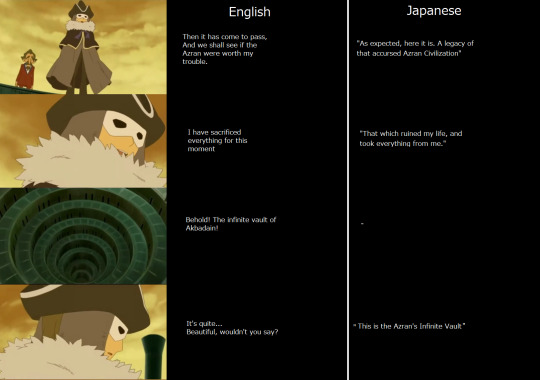
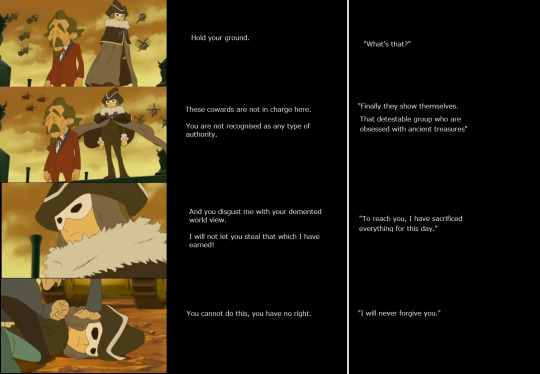
Thinking about the differences between the Japanese and English translations Descole's dialogue of this scene in particular... The Japanese version exemplifies more his pain than his anger, I think.
Have included a very rough translation
#Plus his Japanese voice is so soft#gives the scene a different tone#jean descole#miracle mask#professor layton#jistdaposts
125 notes
·
View notes
Note
Been replaying sonadow gens in japanese to practice a lil and I'm wondering what's the significance of tails saying boku in katakana.
(also Omega's dialogue is insanely difficult for me)
Boku is a masculine, "boyish" pronoun, informal but much more polite than ore, which is what Sonic, Knuckles and Silver use.
Tails using boku indicates that he's a young, polite boy. Shadow using boku indicates a general level of politeness, soft-spokenness that you wouldn't expect from his archetype - in English it was kept by having him referring to Eggman as "Doctor".
I'm not really sure of the difference between using a pronoun in kanji and in katakana, though.
Omega speaks in katakana, right? It's hard to read, yeah. I remember watching Gamma's story in Japanese, and he too speaks in katakana (it's a thing with robots), but his speech pattern is actually very simple. Hey, it's good practice :P
34 notes
·
View notes
Note
Thank you so much for your translations as always! I was wondering, when the tweels talk about each other -- I know that they don't use the normal age specific brother words like older brother/younger brother -- do they use the more neutral 兄弟/kyoudai? Or is there another word for brother that doesn't have age attached? Do they use 双子/futago for themselves or just brother/sibling?
Thanks!
Hello hello! Thank you for this question! 🐬🦈
I have never been able to answer this in a satisfactory way 💦 I will do my best!
Jade and Floyd call each other, exclusively, by their first names!
("Bro" and "brother" will sometimes be added to their EN dialogue, but those are words they have never actually said.)


This is because neither twin is older than the other and, as you point out, there isn't really a word for just "brother" in the Japanese language that does not insinuate age, with even twins differentiating between who was born first and who was born second, as that is just how the language is set up.


You might say that there are kind of two genres of words for "sibling" (and its variations) in the Japanese language:
Calling: The kind you use in place of your sibling's name
Describing: The kind you use just to describe how you are related to one another

Ortho is an excellent example of the "calling" pattern: he does not call Idia by name, only by "Nii-san" for "older brother."
On EN this has been localized as "Idia," because that is the American-English-language equivalent of what Ortho is doing: calling Idia.

(This is aspect of their relationship is so important that it comes up directly in Book 6, when Ortho is dismissed from his role of Idia's younger brother and actually does call him "Idia-san," for possibly the first time in his life. More here.)

In English this would be the equivalent of refusing to call your older brother anything but "older brother," even when he is not in the room and you are talking to an unrelated person.


Other examples in the game of the "calling" pattern are Najma and Leona, who use "onii-chan" and "aniki" (respectively) for their older brothers in sentences that would, in English, exchange those words for their siblings' names.

And an important moment in Jack and Ruggie's relationship is a line where Jack asks permission to call Ruggie "aniki"!
If Ruggie had said yes, Jack would have started calling him "aniki" in the same way as Ortho calls Idia "nii-san."

Then there is the "describing" pattern: words like kyoudai (siblings), otouto (little brother), etc.

These words are closer to their English-language equivalents in that they are used to describe familial relationships, but not used in place of your sibling's name.

Idia will describe his and Ortho's relationship by saying that they are "kyoudai" or "he is my otouto," for example, but grammatically he is not substituting Ortho's name with those words--he calls Ortho, Ortho.

"Calling" pattern words (nii-san, etc.) do double duty in this way: you can both say "He is my nii-san" and replace your brother's name with "nii-san," but whereas you can say "We are kyoudai," you would not replace your sibling's name with "kyoudai." The rules are different!

(Note: this is for everyday conversation! Japanese is a very flexible language and grammar is often played with in places like certain yakuza-based media franchises.)
And another word that falls into the "describing" pattern? "Futago," for twin!

Jade and Floyd can and do describe one another as "futago" or "kyoudai", but when they talk to/about each other as individuals they call each other by name.

To summarize:
Jade and Floyd describe each other as kyoudai, but do not call each other kyoudai
Jade and Floyd describe each other as futago, but do not call each other futago
Jade and Floyd do not describe or call each other ototuo or onii-san or any variation thereof
Jade and Floyd call each other by their first names, exclusively
I hope this helps! m(_ _)m
76 notes
·
View notes
Text
Kōyō and Mori related post, part 2
... about that problematic Mori's phrase from ch 37
Please read [Part 1] before reading this
[In Russian] and [abt translation of this dialogue in Russian]
@emilover-1 and @plinko-mori, I hope you'll read it once 𖹭 Happy new year!
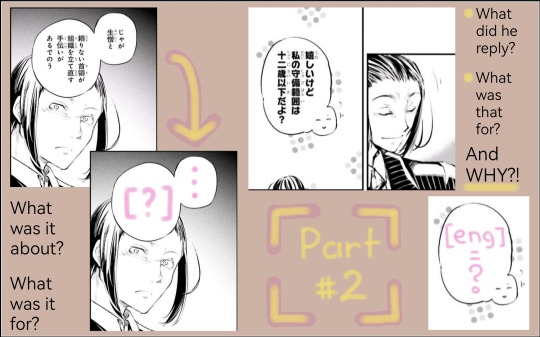
And about his line of behaviour in this situation at all.
Previously Kōyō said: Of course. But sad to say, I need to help our unreliable boss get this organization back in order. The one to whom my hatred belongs is your predecessor. Right now, I'm feeling pretty good about being here.
(Japanese: 無論じや。じゃが生憎と頼りない首領が組織を立て直す手伝いがあるでのう。彼の人の仇は先代じゃ。今は此処が気に入っておる)
What did Mori reply (in Japanese)?
He said: 嬉しいけど私の守備範囲は十二歳以下だよ?
To begin with, during the research process, let's maintain absolute neutrality.
meme (or not meme) about it ↘️
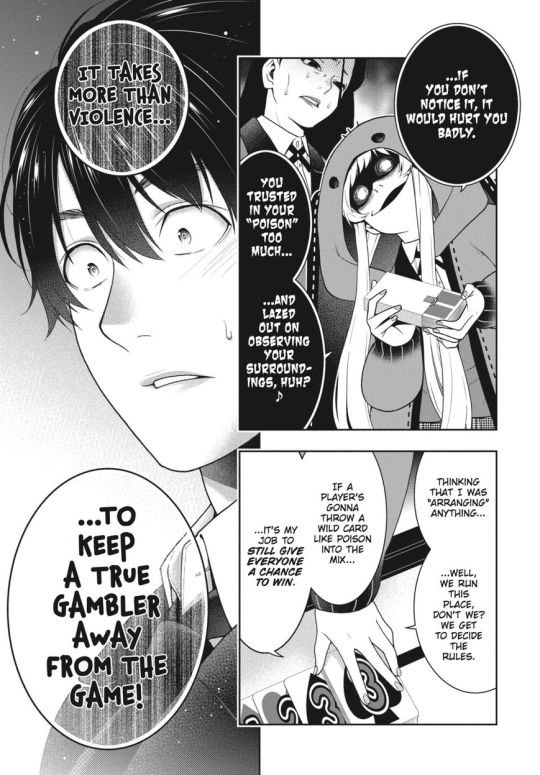
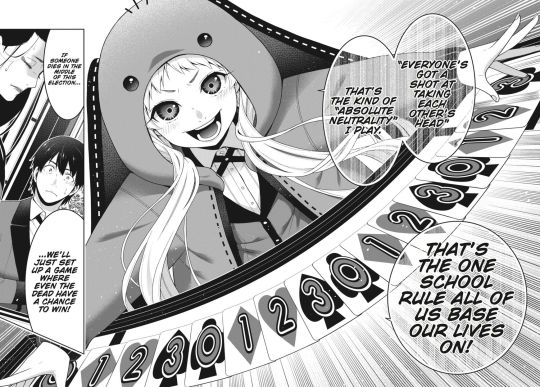
Now you are ready, so we're gonna dissect this fucking phrase!
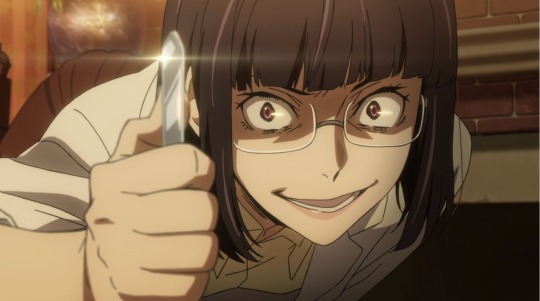
The best known translation are:
I'm quite happy you said that, but I'm only interested in those under 12 years old.
I'm very glad to hear that, but I'm only interested in those under 12, you know?
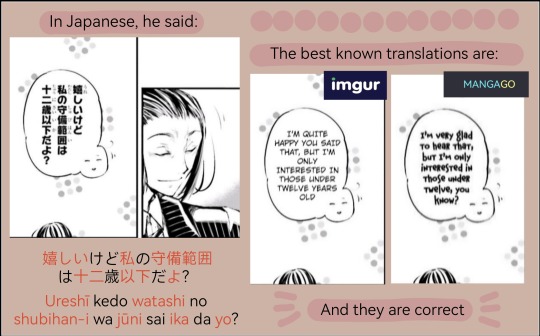
Please, don't worry.
嬉しい - happy, glad. Here = «I'm quite happy you said that», «I'm very glad to hear that» (I prefer the second one, because it rhymes. There wasn't something like this in Japanese version, and I didn't see it in Russian, but here... 🥺 Let them talk in rhyming banter with each other). From the beginning Mori choose the opposite line to her words «sad to say», 生憎と. It's funny.
けど - «but», follows is contradictory to what comes before. (And you use が to say «but» when ideas are in contrast)
私 - I (official or just gender neutral version of the pronoun «I», using by many people now)
私の - my
守備範囲 - that fucking word 😒🙄🫣
Dictionary says:
しゅびはんい — 守備範囲 — noun
area of the field one is supposed to (or able to) defend (sports term)
(one's) field, (one's) scope, area of expertise, range of topics one can converse about, breadth of one's interests and knowledge
one's type, kind of person one is attracted to
You can use this word meaning «defence» only when you talk about sport. So this isn't about defence in Mori's phrase. Even Japanese dictionaries say so:
Goo:
守備範囲
スポーツで、自分の守るべき範囲。また、守ることができる範囲。スポーツ = sport, スポーツで = in sport. Meaning: «The scope of one's protection. Also, the extent to which it can be protected
自分がすべきことの範囲。また、自分ができることの範囲。«The scope of what you should do. Also, the scope of what you can do»
Weblio:
守備範囲
守ることができる範囲、または守るべき範囲、などを意味する表現 。 That sport term.
趣味・嗜好・異性の顔の造作などにおいて、好みとする対象の広さなどについて言う場合もある。«It may also refer to the extent of one's preference in hobbies, tastes, facial features of the opposite sex, etc.»
The best words to keep together 2nd and 3rd parts from English dictionary entry is «something what you are interested in». Because there's a probability he meant 2nd part and there's a probability he meant 3nd.
は - you really wanna know? Go and read about grammar. Okie, it's the word you use to mark the topic. [Link for grammar]
十二 = 12
歳 - years old
以下 - under
だ - marks present tense and positive sentences. (There are other ways for other sentences) It's a casual form of です. [Link for だ grammar] and [Link for difference between だ and です]
よ - «It indicates that the speaker is offering new information or a new perspective to the listener. Or at the very least, it gives the impression that something new is being offered.» Someone who translated manga added «you know?» for this nuance. [Link]
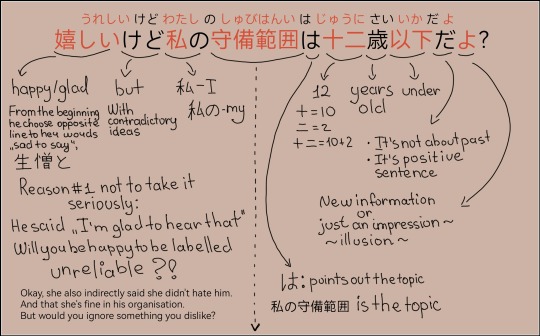
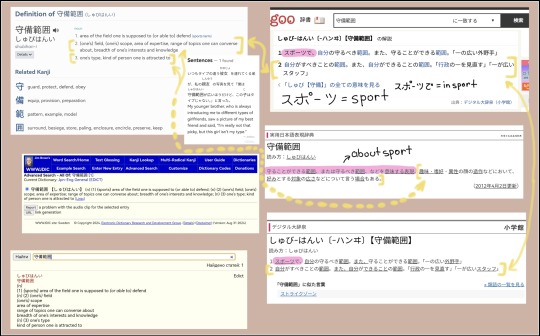
Mori replied «I'm very glad to hear that, but I'm only interested in those under twelve years old, you know?» Sorry, not sorry, it's really these words.
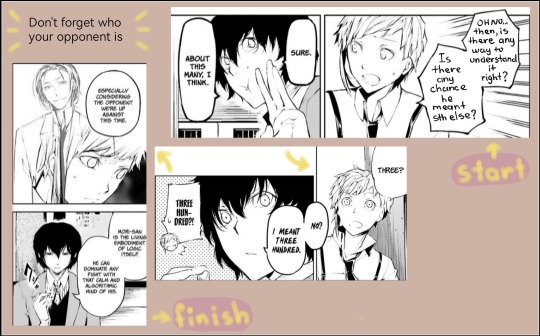
But the game ain't over at all!
What was it about? You know, words, it's a complicated thing...
Noticed something about «glad/happy»? It sounds a bit strange. He can be happy 'cause she doesn't hate him, or she is content to be here. But after the words «unreliable boss»? Is it irony?
Some thoughts of meaning:
Kōyō, but you are an adult! Stop insulting; stop attacking friends! You aren't Elise (Mori, you really thought at least one of them would stop?) In this case, does Elise have Kōyō's traits?
«You hate only the former boss + You like to be here» ➡️ «You like / love me, right? Oh, you know, with your childish behavior, if you were 12, I might have liked you too, maybe» 🤣 Remember, she canonically doesn't love «love». Mori just fights back.
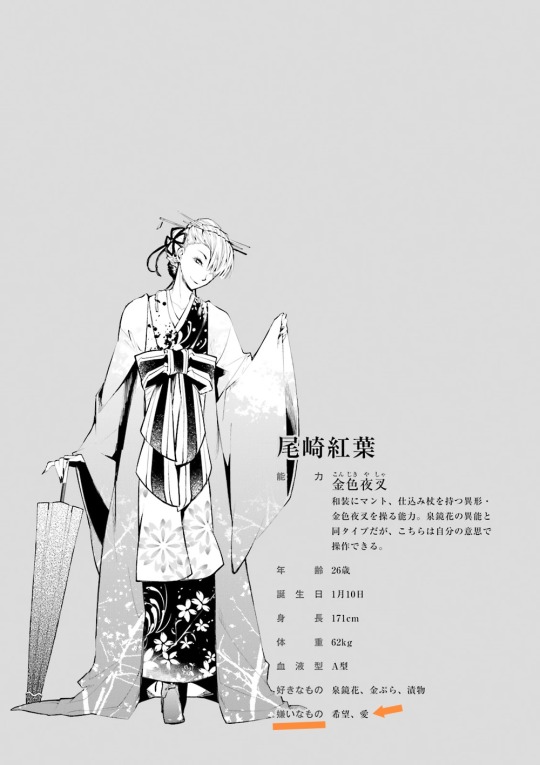
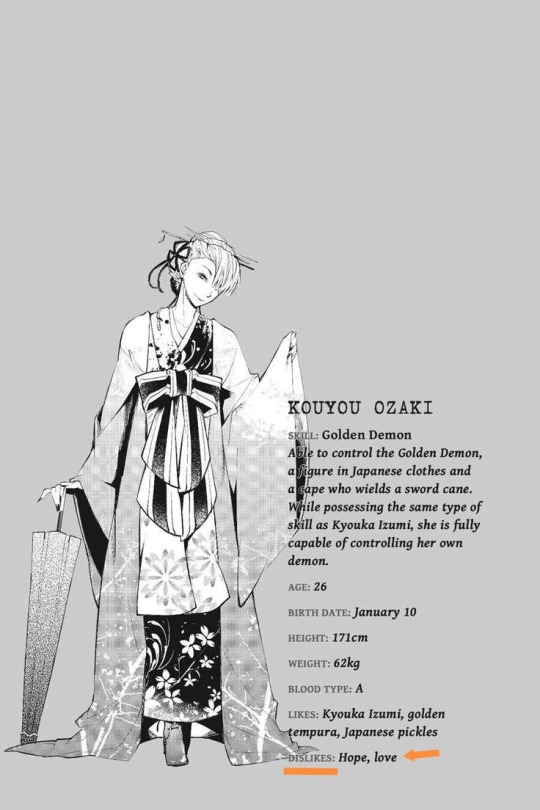
On the other hand, I've heard the version that her words could be a romantic thing. But then he's just a master at shooting people down in the most cringe-worthy way.
Another point: it could be something like «Oh my, you really tHaT oLd? Are you seriously saying you can teach me running the organization? Behave yourself, my another traumatized adopted child» Some years ago she was angry when Chūya called her «Ane-san», but now 🤭

In any case, he made her feel uncomfortable with his shitty words. That's the punishment for willfulness and impoliteness (?)
Why, or what for?
Because she really hurts his feelings
Her phrase and his face are placed on the same frame. It makes sense, and it matters. Look at Mori! His eyes are open, but the lower lid is tensed / squinted, and you can see the expression lines. The iris is white – he usually has black eyes, so she's hit the mark, hit a nerve. The eyebrows are in a normal position, but it feels a little strained. The lips are composed, or there's just a general tensing of all the facial muscles.
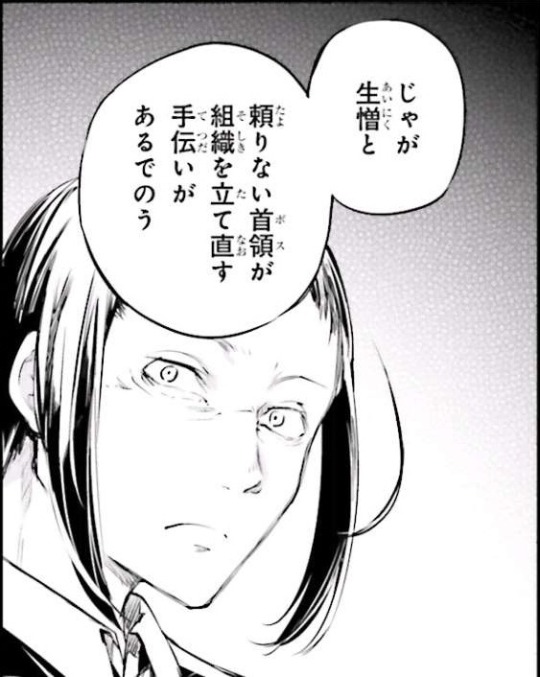
✨ Some interesting information ✨
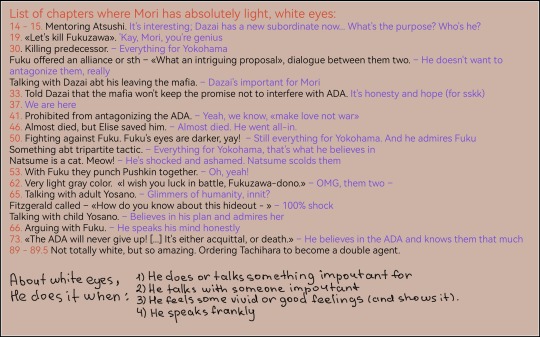
Why he smiled after - because he understood her feelings and thoughts. As an adult is surprised by a child's antics, but then shakes his head with a smile)
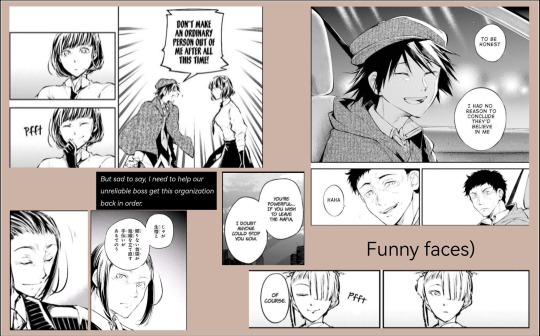
Anime makes this scene worse. Mori's reaction is too weak. All they drew was the basic emotion of surprise, and Mori is a complex character. Harukawa reflects this complexity of emotions: he's surprised, but Koyo's words also evoked displeasure (I'm 99% sure ), a little anxiety is there too (maybe 60-70% sure), insecurity, fear and regret are likely there.
He isn't shocked just a bit surprised but almost calm
For comparison:
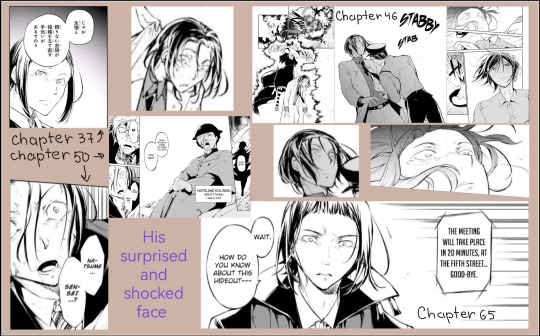
In anime, I like to hear their voices and sound effects. The musical background puts a clear emphasis on the phrase koyo, this is the punchline of the dialogue.
I don't wanna say that Bones didn't try to do their best, but Harukawa is... an entirely different matter. There's no comparison to begin with. Just as... nobody would compare Goddess with anything, right?
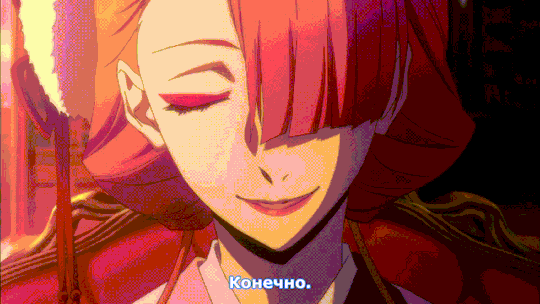
Sorry - not sorry, I'm too lazy to do another gif with eng sub. «Конечно» = «Of course», « К сожалению, мне нужно помочь неуклюжему лидеру восстановить организацию» = «But sad to say, I need to help our unreliable boss get this organization back in order», «Я благодарен, но интересуюсь только теми, кому меньше 12» = «I'm glad to hear that, but I'm only interested in those under , you know?»
And she isn't t that calm yelling at him: «SHUT THE FUCK UP! I will sew your lips together!», if you pay attention to the size of kanji and lines of speech bubble.
Yes, 黙れ is a very rough word. Don't use it, please.
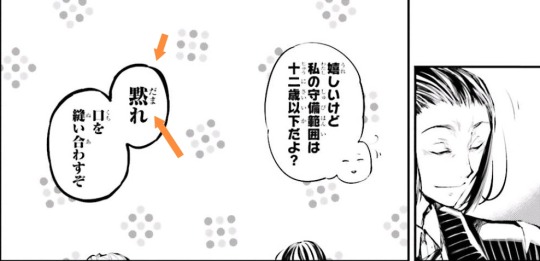
I found this scene in stage play here, file with stage plays, «Bungo Stray Dogs on stage 3». Timeline: start at 2:16:33 and end at 2:17:50
But video shows HER face when she's saying that phrase, so I can't say anything about Mori's facial expression in that moment 😭 How could them -
There's no «彼の人の仇は先代じゃ。今は此処が気に入っておる» (The one to whom my hatred belongs is your predecessor. Right now, I'm feeling pretty good about being here) Both anime and stage play cut these sentences out. Why? The next Mori's phrase looses its sense a little bit in this way, isn't it?! Wtf
Anyway, right after she said her part, and Mori replied, and then she said «damare…», they laughed together. ¯\_(ツ)_/¯
'Cause he's boss
And the insubordination (or something similar) didn't vanish. Akutagawa is his own punishment; honestly, I'm totally agree. But Kōyō – he's just… Taunting her? Hahaha. Best boss ever, isn't he?
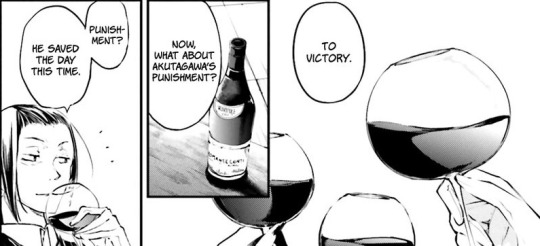
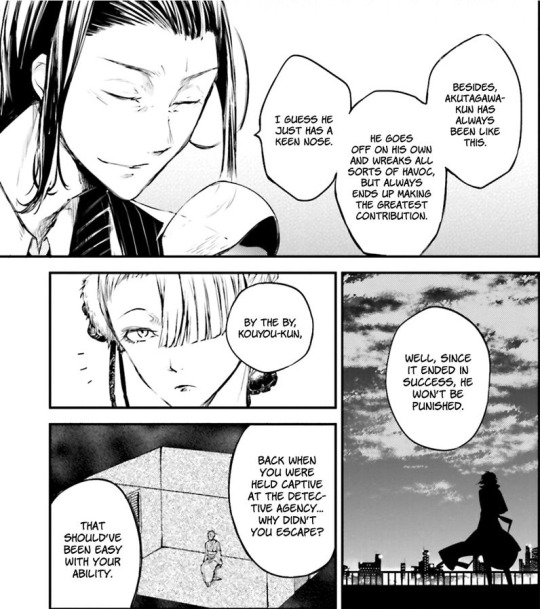
Whatever he meant, she's not okay with these words and we're too. That's the whole punishment. Just to check the box ✅
Boss-of-the-Port-Mafia-Mori-Ougai be like:

And because Mori cares a lot about Kōyō, if you look closely
...he couldn't do something more
I see Mori-Kōyō relationship as his redemption arc. He learns to respect human soul and heart, [心]. (That actual reason why Fukuzawa and Yosano dislike him). He combines therapeutic moments for Kōyō with his «evil mafia plans.» At least he didn't want to traumatize her with the possibility of killing that girl.
It's very interesting to analyse it one day. I will, but not before I read «Kokoro» by Natsume Sōseki. They talk about character-Natsume tactic, and then there's just the concept of the [heart] / [心]. But in Japanese, you read it as [こころ], [kokoro], got it? 🧐
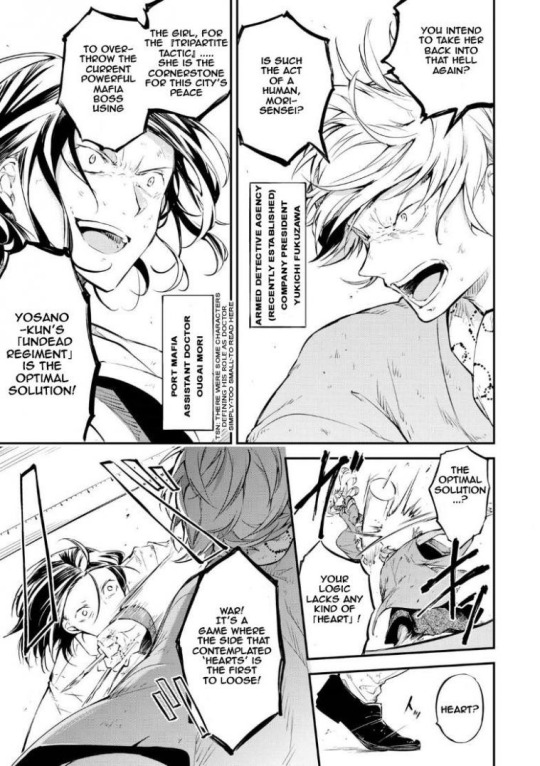
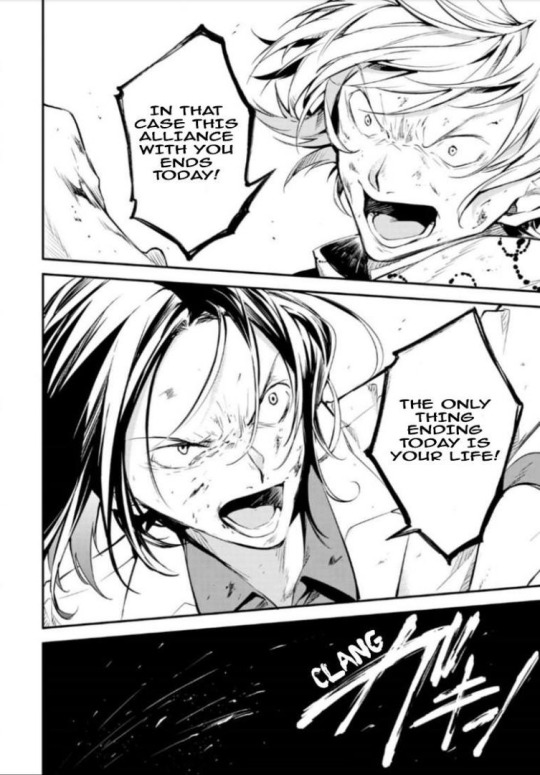
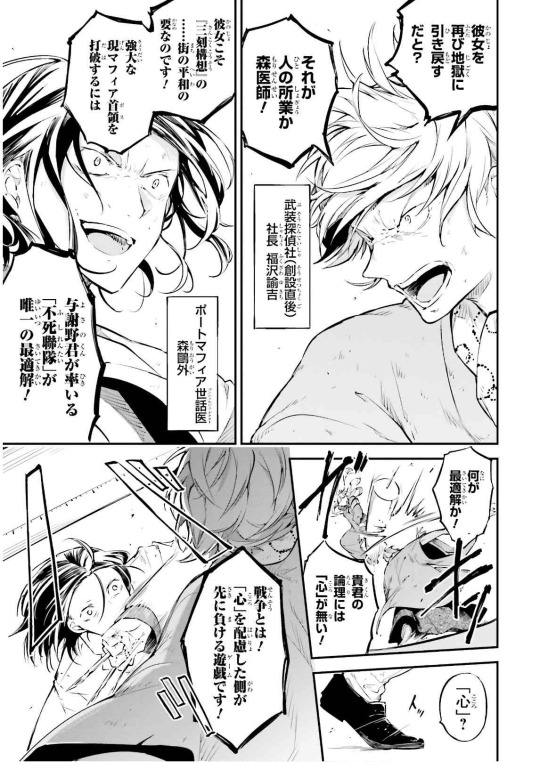
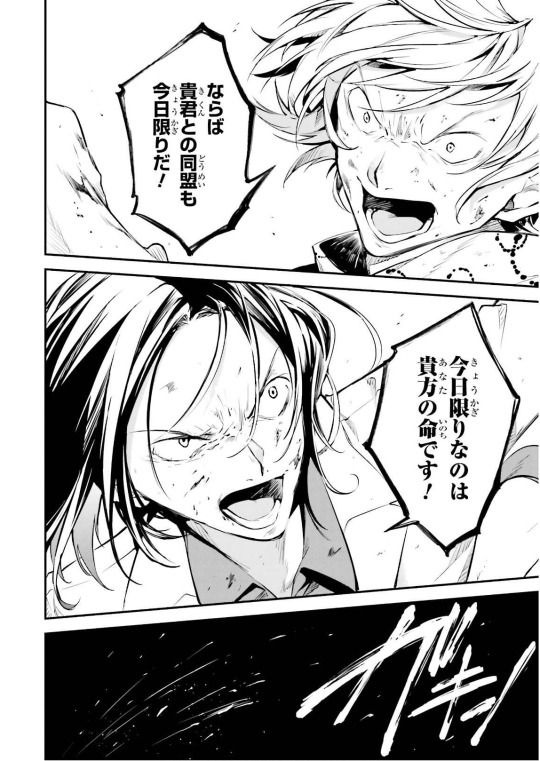
I strongly believe that Mori planned more than that. Why else would he forbid her to take Kyouka back before the conflict started? (Chapters 17-18) He let her see the light to get her away from the mafia. As he let Dazai go. As he offered Higuchi. As 14 y. o. Kōyō wanted. It's good for her to see Kyōka's story, to let her go, to become a better person than the former boss. It's her character development. Mori isn't evil. He does bad things from time to time, but he also does good things.
Guild arc wasn't an easy one for Kōyō. Even if he unintentionally triggered her trust issues and anxiety, he tried to help.
I haven't said anything about 守備範囲 as «(one's) field, (one's) scope, area of expertise, range of topics one can converse about, breadth of one's interests and knowledge», have I? Oops)
Imagine, for example... What if Fukuzawa's words were important to Mori? We didn't even know what happened between them when Rampo and Yosano escaped. Did Fukuzawa run away after «the clock struck 12»? 🤭 Or did Mori actually lose that battle? Or did he lose because he didn't want to win at all? As Natsume's "subordinate" or sth he has to do everything he can for their tactic. But as a human being, well, he regrets traumatizing Yosano. What if he not only let her go but also started learning psychology, soul science?
Kōyō is also traumatized. Mori and Dazai know this. Mori lets her go, but she isn't happy. And what's more, she's using defensive reaction. And Mori just like «You need therapy, girl. But you know, I'm a child psychologist. And it would still be a violation of medical ethics if I were your psychotherapist. (Yeah, sometimes I respect medical ethics)»
What do you think?
...
After the Yosano story, Mori is generally more relaxed about disobeying orders. Because he's not in the military. (Down with bureaucracy!)

Because he realised that if an order was broken, it could be something very important to the person. He doesn't want to break people for the sake of some discipline. And for Koyo, choosing to cooperate with the agency was part of personal growth and healing. She saw herself in Kyōka, and protecting the girl meant protecting them both, and vice versa. Mori couldn't break her. That would be unjustified. He wasn't angry at Kōyō for her decision.
Bonus. Some parallels from the Guild arc:
Mori-Dazai, Kōyō-Kyōka: «We are not the same person, actually. I'm me, you're you. You have the right to choose your path» It was about mentoring, parental love, and letting go.
Mori-Kōyō, Dazai-Akutagawa: «You become stronger. Accept your past and move on from it»
Dazai-Kōyō, Atsushi-Lucy (+ Mori as a mastermind who made these lines possible with his orders abt Kyōka and Q): «Do not abandon the past versions of ourselves»
And keep in mind 2 things:
Mori must keep a balance between etiquette, subordination, and responsibilities on the one hand and his feelings and ulterior motives on the other hand
Sometimes he's a living cringe and a lying liar who lies 😑
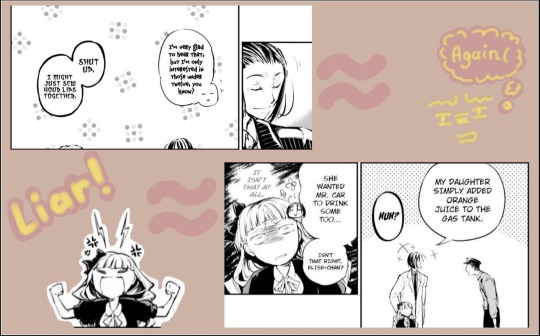
The characters' phrases cannot be viewed without context. They don't exist in a vacuum. They have reasons, occasions, and purposes for saying certain things.
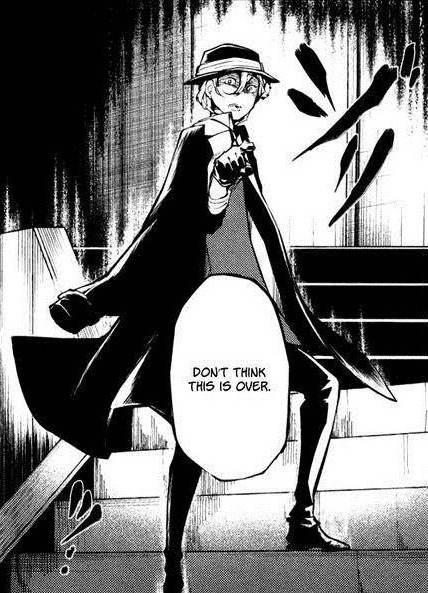
I have many other thoughts about these phrases and this dialogue!
But not today

#bungou stray dogs#bsd#bsd analysis#bsd thoughts#bsd theories#bsd language analysis#fandom analysis#bsd chapter 37#bsd mori#ougai mori#mori ougai#bsd kouyou#bsd koyou#bsd koyo#kouyou ozaki#ozaki kouyou#japanese#translation#bsd manga#manga#bsd mori analysis
28 notes
·
View notes